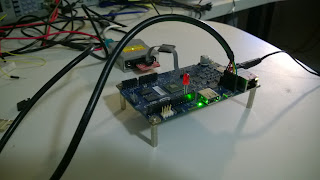I believe this topic on ExInterlockedPopEntrySList might be interesting for Windows drivers developers.
Safety of using ExInterlockedPopEntrySList
The question was
To my knowledge, pre-Windows 8 x64 implementations of SList use 9-bit sequence
numbers in the SLIST_HEADER. This means that 512 operations can complete
concurrently (without progress from particular thread) until an ABA problem
potentially manifests. I wonder whether, depending on the number of threads and
physical cores, this couldn't plausibly occur. To further complicate, the kernel
could run on a vcpu, creating time discontinuities.
I would like to ask:
1. Does the Windows scheduler protect against ABA by, e.g., restarting
interlocked operation upon preemption?
2. Is there some protection against hypervisor interference?
3. In the light of the above concerns, is SList on a pre-Windows 8 x64
deployment really safe for all workloads?
I would have speculated that per-thread kernel allocator behavior was factored
in for the ABA avoidance, but the primitives are in the Win32 API as well and
any driver can employ custom pool allocator.
My answer was
I looked at the code again and found that interrupt processing code has a fixup
for SList . There is a routine KiCheckForSListAddress. This routine is called at
DISPATCH_LEVEL before returning from an interrupt and it fixes the EIP(RIP for
x64) of a trap frame to restart SList pop operation if interrupt happened inside
ExInterlockedPopEntrySList. So when an interrupt processing code returns
execution to an interrupted code the code resumes at the beginning of
ExInterlockedPopEntrySList ( namely ExpInterlockedPopEntrySListResume ).
kd> uf KiCheckForSListAddress
nt!KiCheckForSListAddress:
82acbdf1 0fb7416c movzx eax,word ptr [ecx+6Ch]
82acbdf5 8b5168 mov edx,dword ptr [ecx+68h]
82acbdf8 6683f808 cmp ax,8
82acbdfc 7511 jne nt!KiCheckForSListAddress+0x1e (82acbe0f)
Branch
nt!KiCheckForSListAddress+0xd:
82acbdfe b8f4dda882 mov eax,offset nt!ExpInterlockedPopEntrySListResume
(82a8ddf4)
82acbe03 3bd0 cmp edx,eax
82acbe05 7222 jb nt!KiCheckForSListAddress+0x38 (82acbe29)
Branch
nt!KiCheckForSListAddress+0x16:
82acbe07 81fa1fdea882 cmp edx,offset nt!ExpInterlockedPopEntrySListEnd
(82a8de1f)
82acbe0d eb15 jmp nt!KiCheckForSListAddress+0x33 (82acbe24)
Branch
nt!KiCheckForSListAddress+0x1e:
82acbe0f 6683f81b cmp ax,1Bh
82acbe13 7514 jne nt!KiCheckForSListAddress+0x38 (82acbe29)
Branch
nt!KiCheckForSListAddress+0x24:
82acbe15 a1ac69bb82 mov eax,dword ptr [nt!KeUserPopEntrySListResume
(82bb69ac)]
82acbe1a 3bd0 cmp edx,eax
82acbe1c 720b jb nt!KiCheckForSListAddress+0x38 (82acbe29)
Branch
nt!KiCheckForSListAddress+0x2d:
82acbe1e 3b15a469bb82 cmp edx,dword ptr [nt!KeUserPopEntrySListEnd
(82bb69a4)]
nt!KiCheckForSListAddress+0x33:
82acbe24 7703 ja nt!KiCheckForSListAddress+0x38 (82acbe29)
Branch
nt!KiCheckForSListAddress+0x35:
82acbe26 894168 mov dword ptr [ecx+68h],eax
nt!KiCheckForSListAddress+0x38:
82acbe29 c3 ret Branch
Safety of using ExInterlockedPopEntrySList
The question was
My answer was





















